New Zealand Post Assignment 2
VerifiedAdded on 2023/01/16
|7
|2081
|33
AI Summary
This assignment explores the history of the post office in New Zealand, its operation management principles, continuous improvement techniques, and compliance requirements. It discusses the challenges faced by New Zealand Post in the modern era and provides recommendations for the future.
Contribute Materials
Your contribution can guide someone’s learning journey. Share your
documents today.
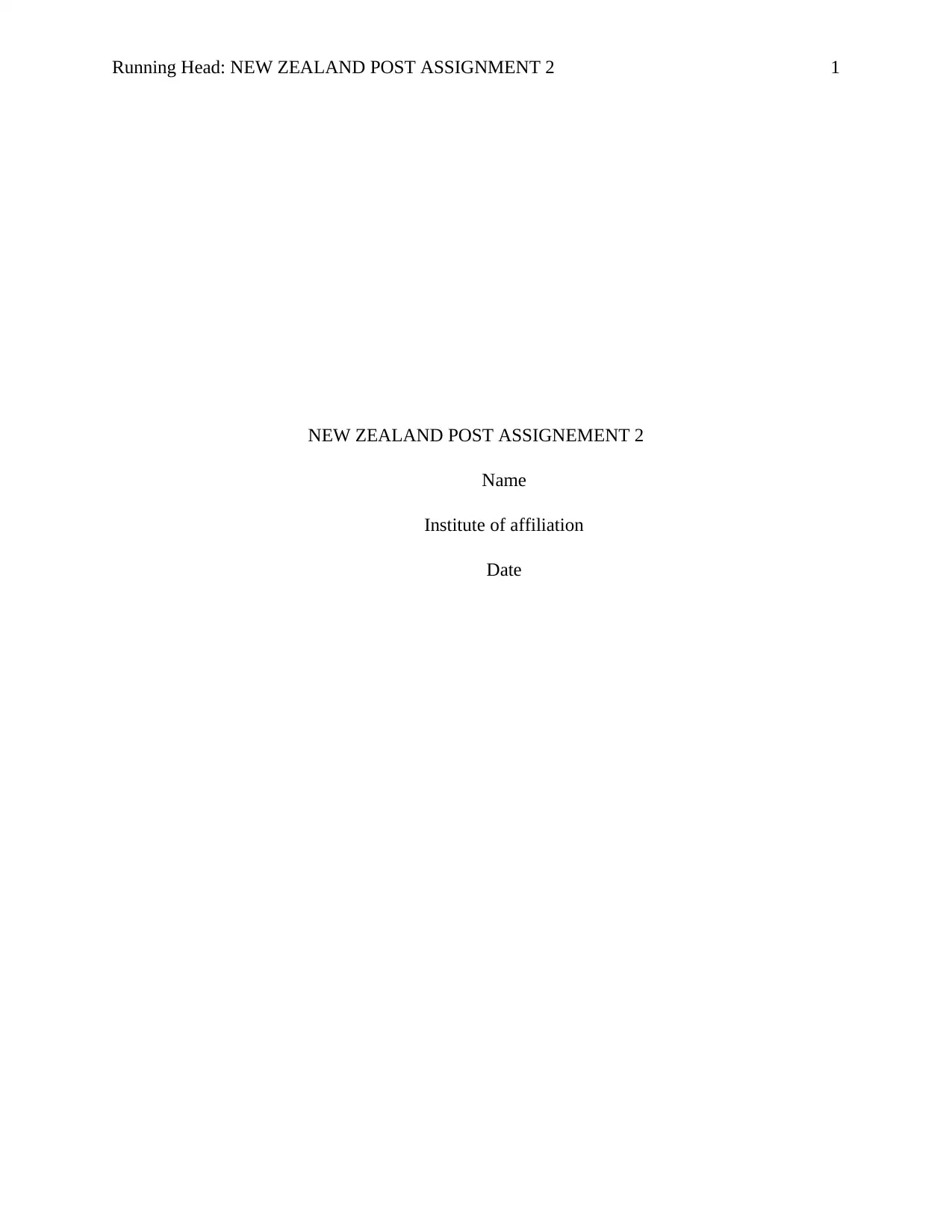
Running Head: NEW ZEALAND POST ASSIGNMENT 2 1
NEW ZEALAND POST ASSIGNEMENT 2
Name
Institute of affiliation
Date
NEW ZEALAND POST ASSIGNEMENT 2
Name
Institute of affiliation
Date
Secure Best Marks with AI Grader
Need help grading? Try our AI Grader for instant feedback on your assignments.
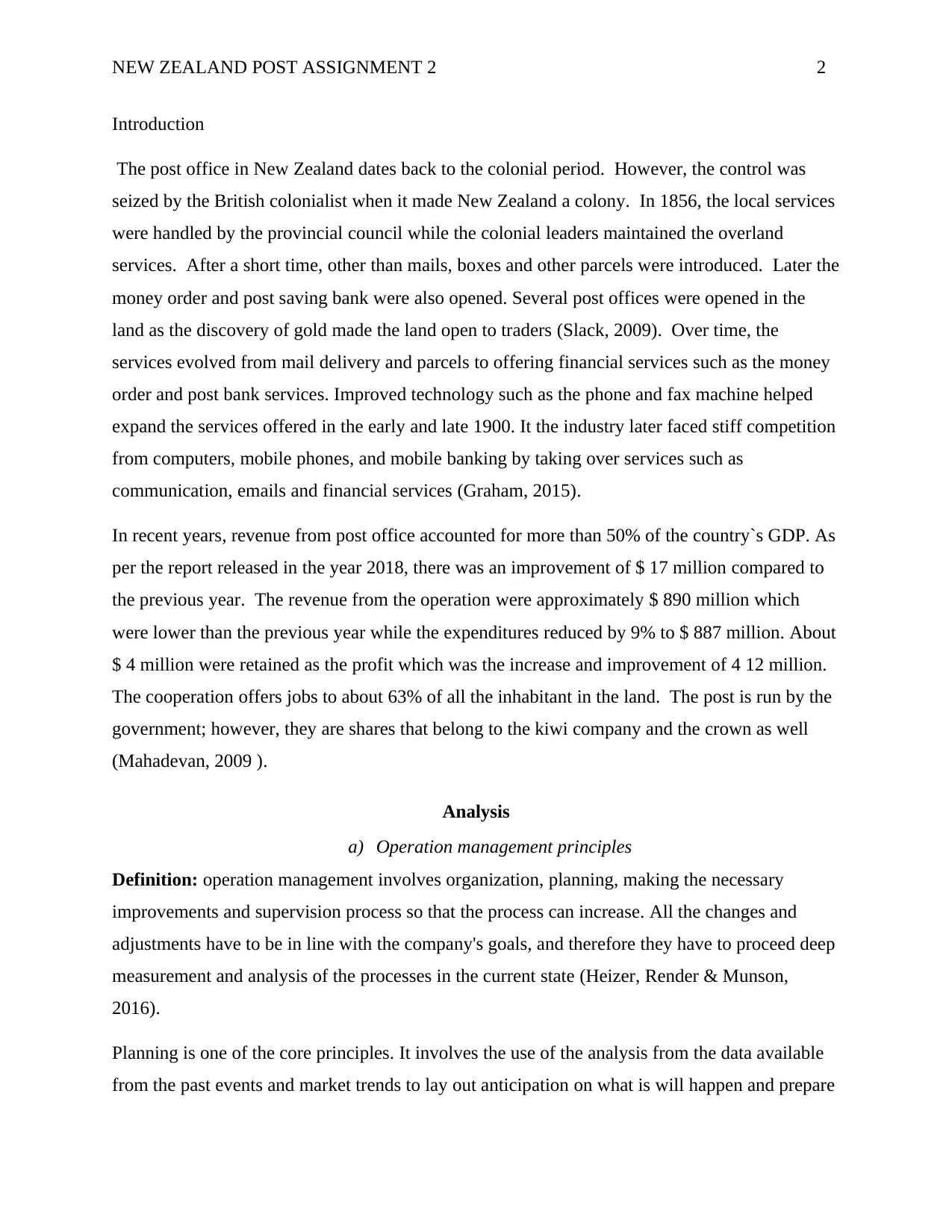
NEW ZEALAND POST ASSIGNMENT 2 2
Introduction
The post office in New Zealand dates back to the colonial period. However, the control was
seized by the British colonialist when it made New Zealand a colony. In 1856, the local services
were handled by the provincial council while the colonial leaders maintained the overland
services. After a short time, other than mails, boxes and other parcels were introduced. Later the
money order and post saving bank were also opened. Several post offices were opened in the
land as the discovery of gold made the land open to traders (Slack, 2009). Over time, the
services evolved from mail delivery and parcels to offering financial services such as the money
order and post bank services. Improved technology such as the phone and fax machine helped
expand the services offered in the early and late 1900. It the industry later faced stiff competition
from computers, mobile phones, and mobile banking by taking over services such as
communication, emails and financial services (Graham, 2015).
In recent years, revenue from post office accounted for more than 50% of the country`s GDP. As
per the report released in the year 2018, there was an improvement of $ 17 million compared to
the previous year. The revenue from the operation were approximately $ 890 million which
were lower than the previous year while the expenditures reduced by 9% to $ 887 million. About
$ 4 million were retained as the profit which was the increase and improvement of 4 12 million.
The cooperation offers jobs to about 63% of all the inhabitant in the land. The post is run by the
government; however, they are shares that belong to the kiwi company and the crown as well
(Mahadevan, 2009 ).
Analysis
a) Operation management principles
Definition: operation management involves organization, planning, making the necessary
improvements and supervision process so that the process can increase. All the changes and
adjustments have to be in line with the company's goals, and therefore they have to proceed deep
measurement and analysis of the processes in the current state (Heizer, Render & Munson,
2016).
Planning is one of the core principles. It involves the use of the analysis from the data available
from the past events and market trends to lay out anticipation on what is will happen and prepare
Introduction
The post office in New Zealand dates back to the colonial period. However, the control was
seized by the British colonialist when it made New Zealand a colony. In 1856, the local services
were handled by the provincial council while the colonial leaders maintained the overland
services. After a short time, other than mails, boxes and other parcels were introduced. Later the
money order and post saving bank were also opened. Several post offices were opened in the
land as the discovery of gold made the land open to traders (Slack, 2009). Over time, the
services evolved from mail delivery and parcels to offering financial services such as the money
order and post bank services. Improved technology such as the phone and fax machine helped
expand the services offered in the early and late 1900. It the industry later faced stiff competition
from computers, mobile phones, and mobile banking by taking over services such as
communication, emails and financial services (Graham, 2015).
In recent years, revenue from post office accounted for more than 50% of the country`s GDP. As
per the report released in the year 2018, there was an improvement of $ 17 million compared to
the previous year. The revenue from the operation were approximately $ 890 million which
were lower than the previous year while the expenditures reduced by 9% to $ 887 million. About
$ 4 million were retained as the profit which was the increase and improvement of 4 12 million.
The cooperation offers jobs to about 63% of all the inhabitant in the land. The post is run by the
government; however, they are shares that belong to the kiwi company and the crown as well
(Mahadevan, 2009 ).
Analysis
a) Operation management principles
Definition: operation management involves organization, planning, making the necessary
improvements and supervision process so that the process can increase. All the changes and
adjustments have to be in line with the company's goals, and therefore they have to proceed deep
measurement and analysis of the processes in the current state (Heizer, Render & Munson,
2016).
Planning is one of the core principles. It involves the use of the analysis from the data available
from the past events and market trends to lay out anticipation on what is will happen and prepare
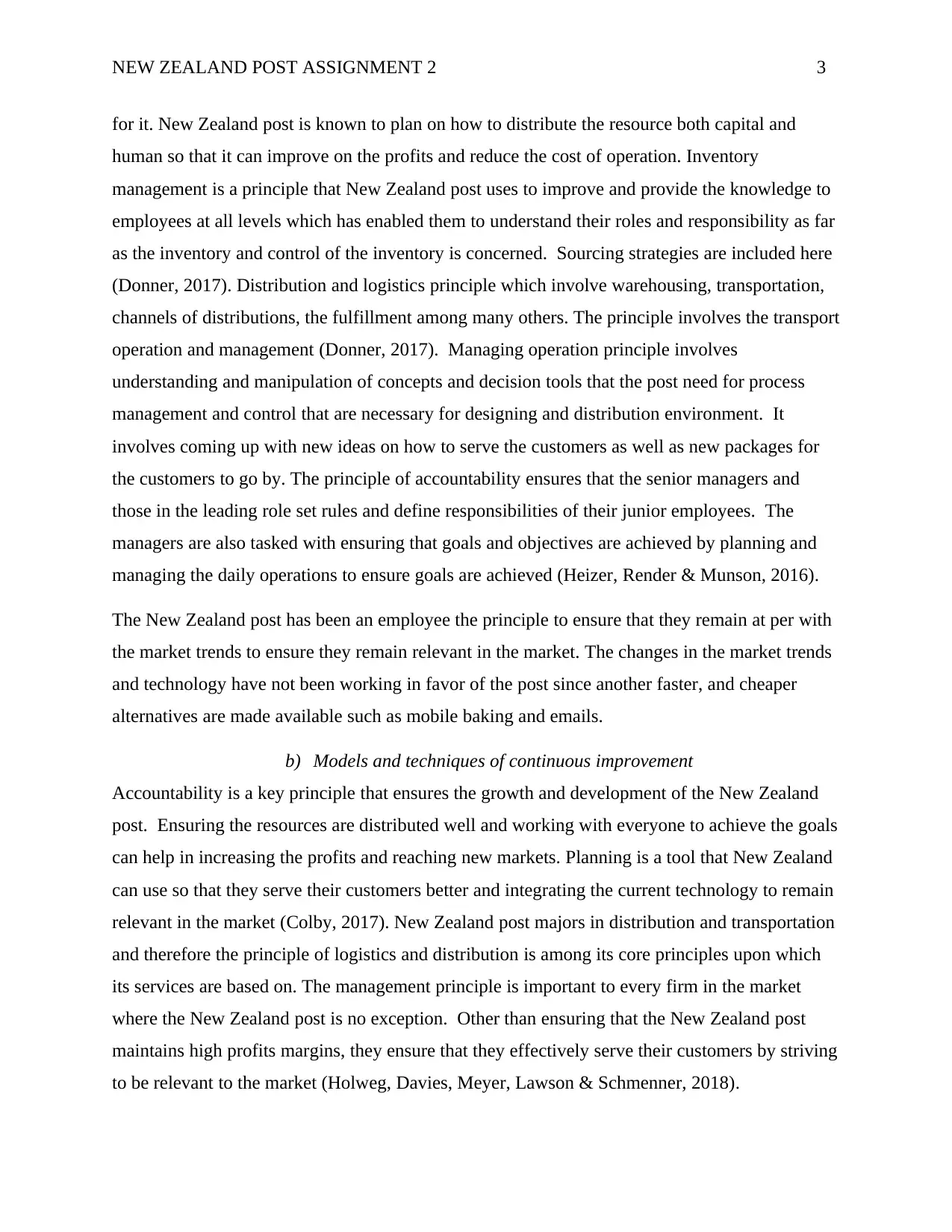
NEW ZEALAND POST ASSIGNMENT 2 3
for it. New Zealand post is known to plan on how to distribute the resource both capital and
human so that it can improve on the profits and reduce the cost of operation. Inventory
management is a principle that New Zealand post uses to improve and provide the knowledge to
employees at all levels which has enabled them to understand their roles and responsibility as far
as the inventory and control of the inventory is concerned. Sourcing strategies are included here
(Donner, 2017). Distribution and logistics principle which involve warehousing, transportation,
channels of distributions, the fulfillment among many others. The principle involves the transport
operation and management (Donner, 2017). Managing operation principle involves
understanding and manipulation of concepts and decision tools that the post need for process
management and control that are necessary for designing and distribution environment. It
involves coming up with new ideas on how to serve the customers as well as new packages for
the customers to go by. The principle of accountability ensures that the senior managers and
those in the leading role set rules and define responsibilities of their junior employees. The
managers are also tasked with ensuring that goals and objectives are achieved by planning and
managing the daily operations to ensure goals are achieved (Heizer, Render & Munson, 2016).
The New Zealand post has been an employee the principle to ensure that they remain at per with
the market trends to ensure they remain relevant in the market. The changes in the market trends
and technology have not been working in favor of the post since another faster, and cheaper
alternatives are made available such as mobile baking and emails.
b) Models and techniques of continuous improvement
Accountability is a key principle that ensures the growth and development of the New Zealand
post. Ensuring the resources are distributed well and working with everyone to achieve the goals
can help in increasing the profits and reaching new markets. Planning is a tool that New Zealand
can use so that they serve their customers better and integrating the current technology to remain
relevant in the market (Colby, 2017). New Zealand post majors in distribution and transportation
and therefore the principle of logistics and distribution is among its core principles upon which
its services are based on. The management principle is important to every firm in the market
where the New Zealand post is no exception. Other than ensuring that the New Zealand post
maintains high profits margins, they ensure that they effectively serve their customers by striving
to be relevant to the market (Holweg, Davies, Meyer, Lawson & Schmenner, 2018).
for it. New Zealand post is known to plan on how to distribute the resource both capital and
human so that it can improve on the profits and reduce the cost of operation. Inventory
management is a principle that New Zealand post uses to improve and provide the knowledge to
employees at all levels which has enabled them to understand their roles and responsibility as far
as the inventory and control of the inventory is concerned. Sourcing strategies are included here
(Donner, 2017). Distribution and logistics principle which involve warehousing, transportation,
channels of distributions, the fulfillment among many others. The principle involves the transport
operation and management (Donner, 2017). Managing operation principle involves
understanding and manipulation of concepts and decision tools that the post need for process
management and control that are necessary for designing and distribution environment. It
involves coming up with new ideas on how to serve the customers as well as new packages for
the customers to go by. The principle of accountability ensures that the senior managers and
those in the leading role set rules and define responsibilities of their junior employees. The
managers are also tasked with ensuring that goals and objectives are achieved by planning and
managing the daily operations to ensure goals are achieved (Heizer, Render & Munson, 2016).
The New Zealand post has been an employee the principle to ensure that they remain at per with
the market trends to ensure they remain relevant in the market. The changes in the market trends
and technology have not been working in favor of the post since another faster, and cheaper
alternatives are made available such as mobile baking and emails.
b) Models and techniques of continuous improvement
Accountability is a key principle that ensures the growth and development of the New Zealand
post. Ensuring the resources are distributed well and working with everyone to achieve the goals
can help in increasing the profits and reaching new markets. Planning is a tool that New Zealand
can use so that they serve their customers better and integrating the current technology to remain
relevant in the market (Colby, 2017). New Zealand post majors in distribution and transportation
and therefore the principle of logistics and distribution is among its core principles upon which
its services are based on. The management principle is important to every firm in the market
where the New Zealand post is no exception. Other than ensuring that the New Zealand post
maintains high profits margins, they ensure that they effectively serve their customers by striving
to be relevant to the market (Holweg, Davies, Meyer, Lawson & Schmenner, 2018).
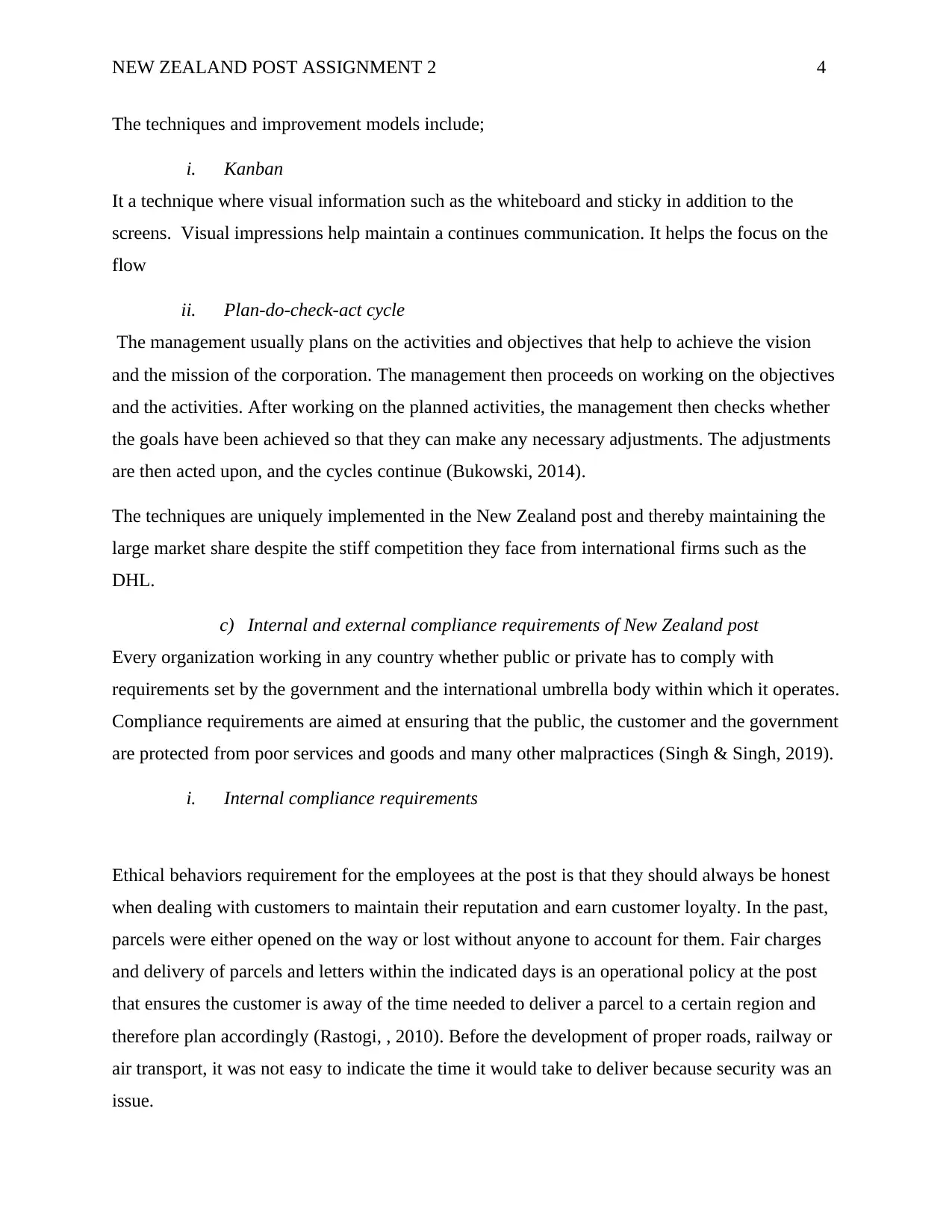
NEW ZEALAND POST ASSIGNMENT 2 4
The techniques and improvement models include;
i. Kanban
It a technique where visual information such as the whiteboard and sticky in addition to the
screens. Visual impressions help maintain a continues communication. It helps the focus on the
flow
ii. Plan-do-check-act cycle
The management usually plans on the activities and objectives that help to achieve the vision
and the mission of the corporation. The management then proceeds on working on the objectives
and the activities. After working on the planned activities, the management then checks whether
the goals have been achieved so that they can make any necessary adjustments. The adjustments
are then acted upon, and the cycles continue (Bukowski, 2014).
The techniques are uniquely implemented in the New Zealand post and thereby maintaining the
large market share despite the stiff competition they face from international firms such as the
DHL.
c) Internal and external compliance requirements of New Zealand post
Every organization working in any country whether public or private has to comply with
requirements set by the government and the international umbrella body within which it operates.
Compliance requirements are aimed at ensuring that the public, the customer and the government
are protected from poor services and goods and many other malpractices (Singh & Singh, 2019).
i. Internal compliance requirements
Ethical behaviors requirement for the employees at the post is that they should always be honest
when dealing with customers to maintain their reputation and earn customer loyalty. In the past,
parcels were either opened on the way or lost without anyone to account for them. Fair charges
and delivery of parcels and letters within the indicated days is an operational policy at the post
that ensures the customer is away of the time needed to deliver a parcel to a certain region and
therefore plan accordingly (Rastogi, , 2010). Before the development of proper roads, railway or
air transport, it was not easy to indicate the time it would take to deliver because security was an
issue.
The techniques and improvement models include;
i. Kanban
It a technique where visual information such as the whiteboard and sticky in addition to the
screens. Visual impressions help maintain a continues communication. It helps the focus on the
flow
ii. Plan-do-check-act cycle
The management usually plans on the activities and objectives that help to achieve the vision
and the mission of the corporation. The management then proceeds on working on the objectives
and the activities. After working on the planned activities, the management then checks whether
the goals have been achieved so that they can make any necessary adjustments. The adjustments
are then acted upon, and the cycles continue (Bukowski, 2014).
The techniques are uniquely implemented in the New Zealand post and thereby maintaining the
large market share despite the stiff competition they face from international firms such as the
DHL.
c) Internal and external compliance requirements of New Zealand post
Every organization working in any country whether public or private has to comply with
requirements set by the government and the international umbrella body within which it operates.
Compliance requirements are aimed at ensuring that the public, the customer and the government
are protected from poor services and goods and many other malpractices (Singh & Singh, 2019).
i. Internal compliance requirements
Ethical behaviors requirement for the employees at the post is that they should always be honest
when dealing with customers to maintain their reputation and earn customer loyalty. In the past,
parcels were either opened on the way or lost without anyone to account for them. Fair charges
and delivery of parcels and letters within the indicated days is an operational policy at the post
that ensures the customer is away of the time needed to deliver a parcel to a certain region and
therefore plan accordingly (Rastogi, , 2010). Before the development of proper roads, railway or
air transport, it was not easy to indicate the time it would take to deliver because security was an
issue.
Secure Best Marks with AI Grader
Need help grading? Try our AI Grader for instant feedback on your assignments.
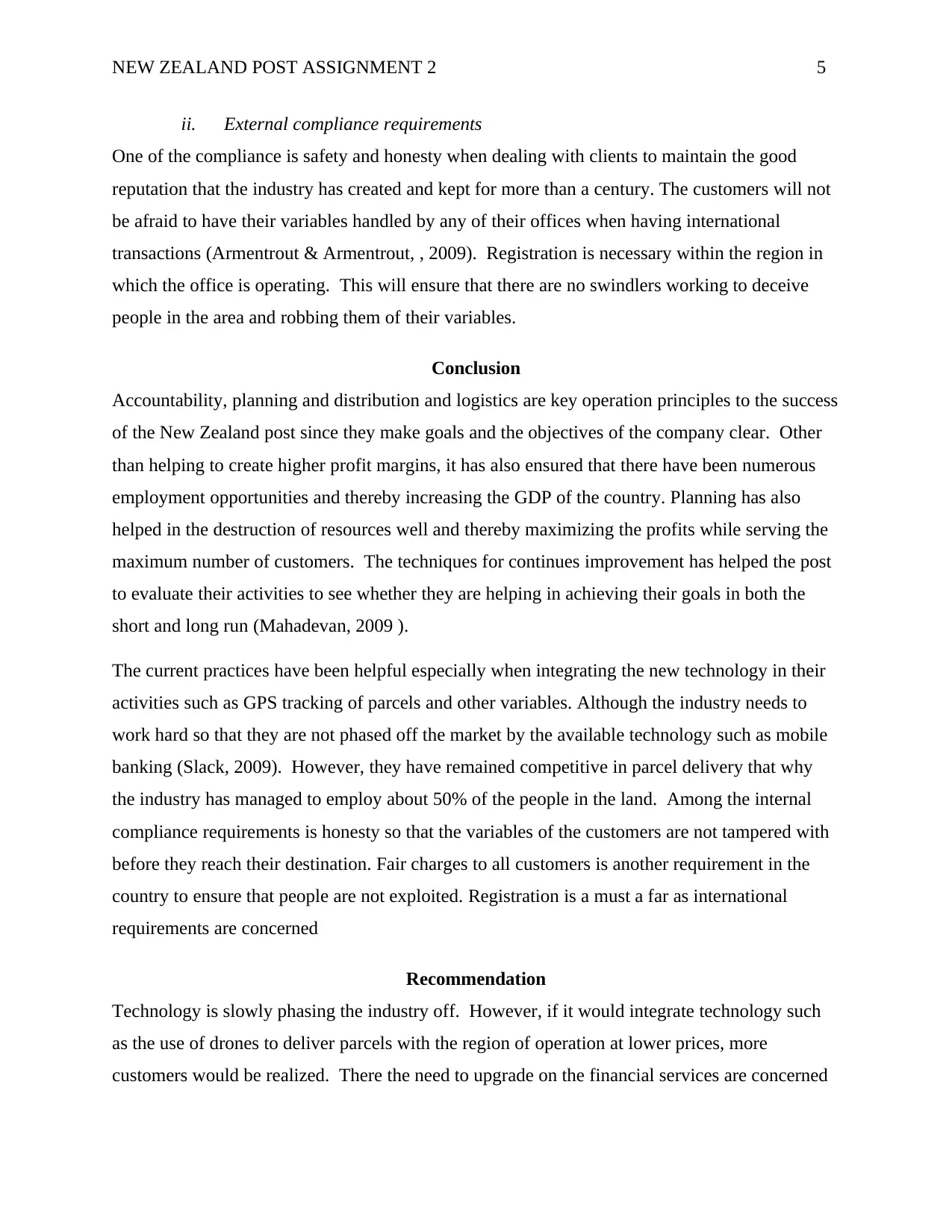
NEW ZEALAND POST ASSIGNMENT 2 5
ii. External compliance requirements
One of the compliance is safety and honesty when dealing with clients to maintain the good
reputation that the industry has created and kept for more than a century. The customers will not
be afraid to have their variables handled by any of their offices when having international
transactions (Armentrout & Armentrout, , 2009). Registration is necessary within the region in
which the office is operating. This will ensure that there are no swindlers working to deceive
people in the area and robbing them of their variables.
Conclusion
Accountability, planning and distribution and logistics are key operation principles to the success
of the New Zealand post since they make goals and the objectives of the company clear. Other
than helping to create higher profit margins, it has also ensured that there have been numerous
employment opportunities and thereby increasing the GDP of the country. Planning has also
helped in the destruction of resources well and thereby maximizing the profits while serving the
maximum number of customers. The techniques for continues improvement has helped the post
to evaluate their activities to see whether they are helping in achieving their goals in both the
short and long run (Mahadevan, 2009 ).
The current practices have been helpful especially when integrating the new technology in their
activities such as GPS tracking of parcels and other variables. Although the industry needs to
work hard so that they are not phased off the market by the available technology such as mobile
banking (Slack, 2009). However, they have remained competitive in parcel delivery that why
the industry has managed to employ about 50% of the people in the land. Among the internal
compliance requirements is honesty so that the variables of the customers are not tampered with
before they reach their destination. Fair charges to all customers is another requirement in the
country to ensure that people are not exploited. Registration is a must a far as international
requirements are concerned
Recommendation
Technology is slowly phasing the industry off. However, if it would integrate technology such
as the use of drones to deliver parcels with the region of operation at lower prices, more
customers would be realized. There the need to upgrade on the financial services are concerned
ii. External compliance requirements
One of the compliance is safety and honesty when dealing with clients to maintain the good
reputation that the industry has created and kept for more than a century. The customers will not
be afraid to have their variables handled by any of their offices when having international
transactions (Armentrout & Armentrout, , 2009). Registration is necessary within the region in
which the office is operating. This will ensure that there are no swindlers working to deceive
people in the area and robbing them of their variables.
Conclusion
Accountability, planning and distribution and logistics are key operation principles to the success
of the New Zealand post since they make goals and the objectives of the company clear. Other
than helping to create higher profit margins, it has also ensured that there have been numerous
employment opportunities and thereby increasing the GDP of the country. Planning has also
helped in the destruction of resources well and thereby maximizing the profits while serving the
maximum number of customers. The techniques for continues improvement has helped the post
to evaluate their activities to see whether they are helping in achieving their goals in both the
short and long run (Mahadevan, 2009 ).
The current practices have been helpful especially when integrating the new technology in their
activities such as GPS tracking of parcels and other variables. Although the industry needs to
work hard so that they are not phased off the market by the available technology such as mobile
banking (Slack, 2009). However, they have remained competitive in parcel delivery that why
the industry has managed to employ about 50% of the people in the land. Among the internal
compliance requirements is honesty so that the variables of the customers are not tampered with
before they reach their destination. Fair charges to all customers is another requirement in the
country to ensure that people are not exploited. Registration is a must a far as international
requirements are concerned
Recommendation
Technology is slowly phasing the industry off. However, if it would integrate technology such
as the use of drones to deliver parcels with the region of operation at lower prices, more
customers would be realized. There the need to upgrade on the financial services are concerned
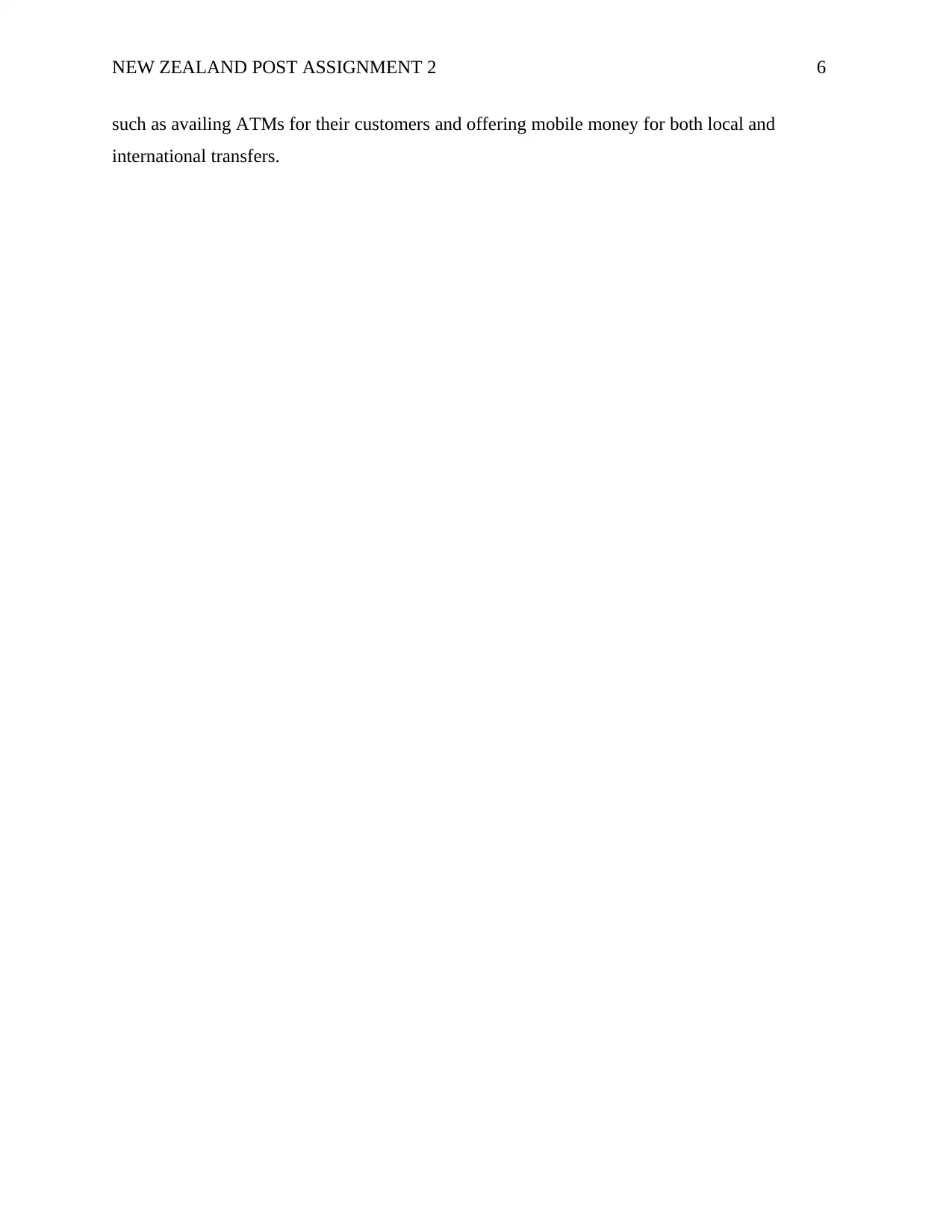
NEW ZEALAND POST ASSIGNMENT 2 6
such as availing ATMs for their customers and offering mobile money for both local and
international transfers.
such as availing ATMs for their customers and offering mobile money for both local and
international transfers.
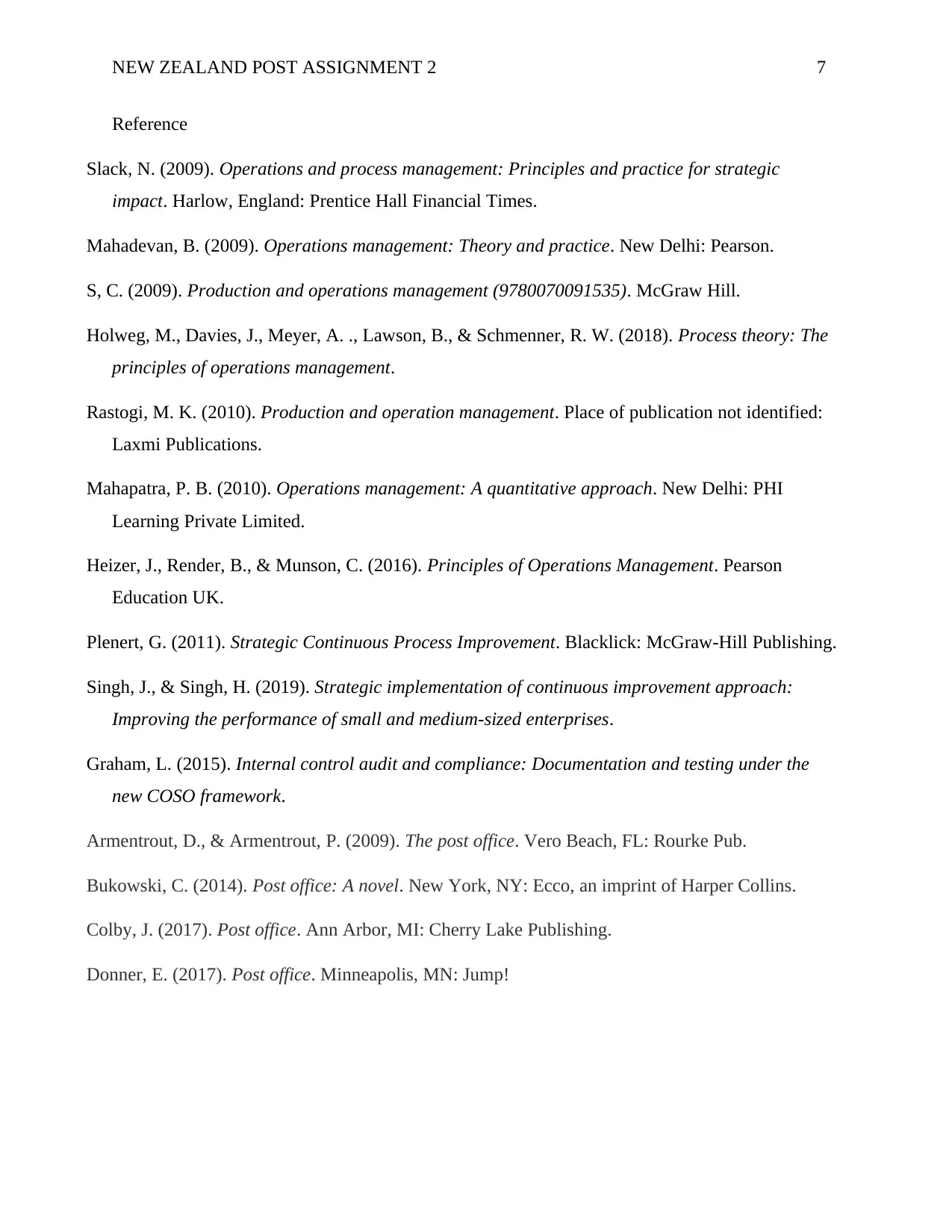
NEW ZEALAND POST ASSIGNMENT 2 7
Reference
Slack, N. (2009). Operations and process management: Principles and practice for strategic
impact. Harlow, England: Prentice Hall Financial Times.
Mahadevan, B. (2009). Operations management: Theory and practice. New Delhi: Pearson.
S, C. (2009). Production and operations management (9780070091535). McGraw Hill.
Holweg, M., Davies, J., Meyer, A. ., Lawson, B., & Schmenner, R. W. (2018). Process theory: The
principles of operations management.
Rastogi, M. K. (2010). Production and operation management. Place of publication not identified:
Laxmi Publications.
Mahapatra, P. B. (2010). Operations management: A quantitative approach. New Delhi: PHI
Learning Private Limited.
Heizer, J., Render, B., & Munson, C. (2016). Principles of Operations Management. Pearson
Education UK.
Plenert, G. (2011). Strategic Continuous Process Improvement. Blacklick: McGraw-Hill Publishing.
Singh, J., & Singh, H. (2019). Strategic implementation of continuous improvement approach:
Improving the performance of small and medium-sized enterprises.
Graham, L. (2015). Internal control audit and compliance: Documentation and testing under the
new COSO framework.
Armentrout, D., & Armentrout, P. (2009). The post office. Vero Beach, FL: Rourke Pub.
Bukowski, C. (2014). Post office: A novel. New York, NY: Ecco, an imprint of Harper Collins.
Colby, J. (2017). Post office. Ann Arbor, MI: Cherry Lake Publishing.
Donner, E. (2017). Post office. Minneapolis, MN: Jump!
Reference
Slack, N. (2009). Operations and process management: Principles and practice for strategic
impact. Harlow, England: Prentice Hall Financial Times.
Mahadevan, B. (2009). Operations management: Theory and practice. New Delhi: Pearson.
S, C. (2009). Production and operations management (9780070091535). McGraw Hill.
Holweg, M., Davies, J., Meyer, A. ., Lawson, B., & Schmenner, R. W. (2018). Process theory: The
principles of operations management.
Rastogi, M. K. (2010). Production and operation management. Place of publication not identified:
Laxmi Publications.
Mahapatra, P. B. (2010). Operations management: A quantitative approach. New Delhi: PHI
Learning Private Limited.
Heizer, J., Render, B., & Munson, C. (2016). Principles of Operations Management. Pearson
Education UK.
Plenert, G. (2011). Strategic Continuous Process Improvement. Blacklick: McGraw-Hill Publishing.
Singh, J., & Singh, H. (2019). Strategic implementation of continuous improvement approach:
Improving the performance of small and medium-sized enterprises.
Graham, L. (2015). Internal control audit and compliance: Documentation and testing under the
new COSO framework.
Armentrout, D., & Armentrout, P. (2009). The post office. Vero Beach, FL: Rourke Pub.
Bukowski, C. (2014). Post office: A novel. New York, NY: Ecco, an imprint of Harper Collins.
Colby, J. (2017). Post office. Ann Arbor, MI: Cherry Lake Publishing.
Donner, E. (2017). Post office. Minneapolis, MN: Jump!
1 out of 7
Related Documents
Your All-in-One AI-Powered Toolkit for Academic Success.
+13062052269
info@desklib.com
Available 24*7 on WhatsApp / Email
![[object Object]](/_next/static/media/star-bottom.7253800d.svg)
Unlock your academic potential
© 2024 | Zucol Services PVT LTD | All rights reserved.





